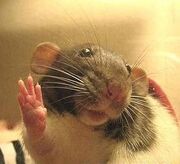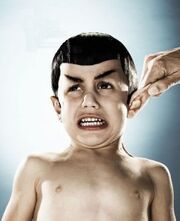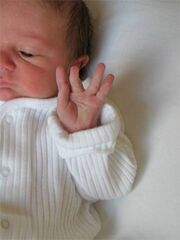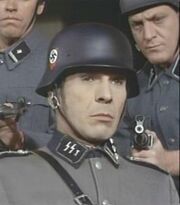The Common Sense Book of Baby and Child Care
In 1946 Hodder published arguably the most influential book of the twentieth century, “The Common Sense Book of Baby and Child Care”. From an initial print run of 10,000 the book went on to sell more than 50 million copies and was translated into 40 languages, making it approximately a quarter as successful as “The DaVinci Code”.
Critics initially dismissed the work and later blamed its success for the excesses of the 1960’s and 70’s. However, the life of almost every child in the western hemisphere was influenced by this seminal tome and its teachings were adopted by the parents of a host of future stars of the political, sporting and entertainment worlds. The subsequent careers of Bill Clinton, O.J. Simpson, Sid Vicious, Britney Spears, Eminem, Tony Blair and Dennis Rodman give the lie to the Neo-Con claim that the book promoted permissiveness and was responsible for the lack of moral character in the current generation.
But just where did the ideas in this book come from and how did it come to be written?
The Author
The man who was to become Dr. Spock was born in 1903 to Sarek, Vulcan ambassador to the United Nations, and human Mildred Stoughton Spock. He was given a name generally considered to be unpronounceable by humans but adopted the name Benjamin to avoid being beaten up at school. As the oldest child, Spock was expected by his parents to help with the care of his five younger siblings and to protect them from Romulan slaving raids. It is thought that it was these early experiences which inspired his twin passions: child rearing and StarFleet.
From an early age Spock seemed an almost preternaturally mature child and chafed at the conventions imposed on him by attending a regular prep school. He learned from his father that Vulcan boys may take the test for adulthood (the "Kahs-wan") at any age by surviving alone in the wilderness for some days and wrestling the carnivorous and venomous Le-Mataya beast. At the age of seven, and stuck in New Haven, Spock took the cross town trolley bus to the zoological gardens and climbed into the petting zoo. Here he attempted to wrestle first a prairie dog and later a llama. When neither chose to fight back he slipped between the bars of the Polar Bear enclosure and was almost killed. Only the intervention of the pet rat he had brought with him saved him. Spock retrieved the rat (also called Ben) from the Polar Bear's throat where it had had lodged, choking the bear to death. Faced with the stark choice of a painfully extended life or a peaceful release for the rodent, Spock logically opted for the latter. That decision marked his choice to follow the philosophy of Surak (logic and emotional control), sparked an interest in healing and confirmed the need to buy larger pets with bigger teeth.
At nine, despite still being at school, Spock was bonded to T’Pring in a Vulcan ceremony described in human terms as “less than a marriage, but more than a betrothal. Kind of like getting your kids to shack up together at an inappropriate age.” Sarek was later arrested for offering photographs of the wedding night for sale and only his diplomatic immunity saved him from imprisonment in a pedophile unit. Young Spock was now even more responsible for his younger siblings and it is not fanciful to believe that the genesis of his famous book lies in this sad episode.
Despite the harrowing nature of his upbringing, young Spock thrived at school, his logical bent lending itself to Mathematics, Science and Metalwork. Though he was subject to merciless bullying on account of his ears, Spock appears to have survived his early years better than many of his tormentors. In particular, a mysterious out-break of fatal illness (thought to be a variety of influenza first identified in France earlier that year) claimed several childhood friends. Spock appears to have survived unscathed from this terryifying incident but at least 8 of his class-mates perished of the mysterious “Death Grippe”, often with no obvious symptom except small finger-shaped bruising on their shoulders.
Having graduated High School top of his year (many of his rivals having fallen prey to the mysterious Death Grippe) he received his undergraduate education at Yale where he became a member of Scroll and Key and the Swilly McBlowchunks Kegging Society. At university he was a keen rower, becoming a member of the U.S. Olympic team. At the 1924 Paris games Spock won a Gold medal and was hailed as a national hero despite suspicions that he may have used his psionic abilities to disrupt the concentration of the British and German eights.
Following graduation Spock attended medical school, graduating in 1929, and did his residency training in paediatrics, apparently having misunderstood his mother’s explanation of Sarek’s keen interest in children. Following graduation he spent some time in Europe absorbing the culture and apparently working in a German orphanage. In 1942 he attempted to become a conscientious objector, denying that he was a coward and insisting instead that “War is illogical”. When this failed to convince the draft board, he made one final protestation that “Violence will solve nothing” before agreeing to found the US Army’s small but influential child psychology unit. It was here that he began to write the book for which he became world famous.
The Book
The Common Sense Book of Baby and Child Care was published immediately after the Second World War. In it Spock advocated ideas about parenting that were, at the time, considered out of the mainstream, though infant betrothal and fighting poisonous animals to graduate from adolescence were quietly dropped at the insistence of the publishers.
Over time, his books helped to bring about a major change in the opinions of parents. Previously, experts had insisted that babies needed to learn to sleep on a regular schedule. Consequently, since Victorian times parents had come to believe that picking up babies and holding them whenever they cried would only teach them to cry more and not to sleep through the night. They were told not to mollycoddle their children because that would not prepare them to be strong and independent individuals in a harsh world.
However, Spock encouraged parents to see their children as Tribbles; to think of them as small, fluffy creatures incapable of independent thought and likely to reproduce uncontrollably if not given constant attention. To wean children off constant attention as they grew older, Spock suggested investing in a Klingon Cloaking Device which would allow parents to enter the nursery, check on their child and leave without detection (unless the presence of a burglar forced them to de-cloak to fire phasers).
His book's famous first line, “You know more than you think you do, despite being an irrational species” reassured parents of their competence. He encouraged parents to trust themselves and decried rigidity in scheduling and ear shapes. Parents, he said, should be reasonable, friendly, and consistent with children; stern and uncompromising with Klingon aggressors.
The book was at times controversial. Spock was accused of advocating permissiveness and blamed for a perceived decline in moral standards. Others criticized the book’s status as a bible for parents, bemoaning its influence on generations of children and complaining that not all parents had the ability to mind-meld with children refusing to eat cauliflower. On the other hand, many parents believe that the book increased their confidence. Women especially found Spock’s assurance that a layer of aluminium foil at the bottom of a cot would block harmful Tachyon emissions from the then newly-invented television very reassuring. His assertion that it was acceptable to be irritated or impatient with nursery rhymes that defied logic was a breath of fresh air.
“Even though the Grand Old Duke of York was halfway up the hill,” he told the world “He was both halfway up and halfway down.”
Controversially, he urged parents to be active in politics in their communities and in the wider solar system, to make their children’s universe a better place. He also advocated that babies should be placed face down to sleep, which many have blamed for thousands of unecessary cot-deaths but which Spock explained would better protect them from impact if there was a sudden need to jump to warp-speed.
Other Interests
Spock taught child development and alien psychology at Case Western University, Ohio until 1967 when he resigned in order to devote himself to the anti-war movement following US bombing of the DMZ (De-militarised Zone) between North and South Vietnam.
“I could no longer stand by and watch my native country violate the Neutral Zone with impunity,” he claimed in his autobiography. “There was little if any evidence that Viet Cong forces had been assimilated by the Borg at this time.”
In 1962 Spock had joined “The Committee for a Sane Nuclear Policy” which advocated unilateral nuclear disarmament for the United States in the long term and refusing to share nuclear secrets with other countries including the United States' European allies. Spock felt that nuclear proliferation in Europe would violate the Prime Directive by unnecessarily interfering with the development of primitive societies such as Britain and France.
“There’s no intelligent life over there,” he proclaimed to widespread agreement.
In 1968 he and four others from the anti-war movement were prosecuted on charges of conspiracy to aid and abet draft resistance. Their defense (that the five had never met in the same room) was dismissed when the CIA demonstrated to an amazed judge how it was possible to set up conference-calling using nothing more complicated than black and white televisions and a StarFleet Tricorder. Alone of the five Spock never served out his sentence as, despite solitary confinement in a Maximum Security Prison, his body continually pixilated out of existence and reappeared at home.
In 1967 Spock had been nominated as Martin Luther King’s vice-presidential running mate. The campaign was not successful, not least due to King's assassination. Spock himself conducted an investigation of the events leading up to King's death, identifying fluctuations in the space time continuum that suggested a mini wormhole had been created opposite the Lorraine Motel, Memphis. Though police arrested Spock's suspect (an unidentified overweight Scotsman), he pleaded the Fifth Amendment. During questioning he is reported to have admitted to sending King several threatening letters denigarting the preacher's stance on racial integration. Asked why he had booked into a hotel across the road from King's with no luggage except a hunting rifle he would say nothing except "I could nae take it." Eventually, police charged another man, but although Spock was unhappy with the investigation, he proclaimed the process to be “Fascinating”.
Despite this tragic disappointment, he became presidential candidate for the pacifist People’s Party in 1972. Across 45 states he campaigned for increased old age pensions, universal medical insurance and free trade under the slogan “Live long and prosper”. The campaign gathered momentum for several months until his candidature was suspended by the Supreme Court who ruled that when the founding fathers had prohibited the candidature of those with alien birth, Spock was exactly what they had in mind.
Denied an active role in the politics of his nation, Spock returned to work as a child psychologist, publishing several more books. Eventually, however, his public spirit and sense of duty prevailed and he became a celebrated Federation of Planets diplomat, following in his father's footsteps and helping to reunite the Romulan Empire with the Vulcans through a shared interest in innovative potty-training regimes.
Retirement
Spock eventually retired in 1990 after a long and distinguished career, residing in various retirement homes in several dimensions. He has no acknowledged children of his own but is said to be very close to a silicon-based life-form he met on his travels.
| Featured version: 14 January 2010 | |
| This article has been featured on the main page. — You can vote for or nominate your favourite articles at Uncyclopedia:VFH. | |






